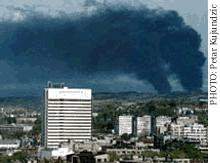
Years After Kosovo War, Poison Air Lingers
by Vesna Peric Zimonjic
 |
by Vesna Peric Zimonjic |
|
 (IPS) BELGRADE --
Three
years after the North Atlantic Treaty Organization (NATO) air strikes against Yugoslavia, people in the area are still breathing in particles of toxic depleted uranium (DU), according to the United Nations Environment Program (UNEP).
(IPS) BELGRADE --
Three
years after the North Atlantic Treaty Organization (NATO) air strikes against Yugoslavia, people in the area are still breathing in particles of toxic depleted uranium (DU), according to the United Nations Environment Program (UNEP).
The latest UNEP report said persisting contamination was recorded at the locations targeted by NATO during the 11 weeks of its air campaign against Yugoslavia. Pekka Haavisto, chair of the DU Assessment Team, said shells with DU ammunition (known as "penetrators") have corroded "amazingly fast" and as a result, DU continues to be constantly released into the air and is spreading -- in the form of particles -- all around the areas that were hit. "The new findings show that the contamination remains widespread, although with low level risks for the population," said Haavisto. "Constant monitoring of water quality is needed, while the site decontamination and construction work could potentially stir up DU dust from the ground surface in the future," he added. DU is a waste product of the process used to enrich natural uranium ore for nuclear reactors or nuclear weapons. It is used in the tips of bullets or warheads to pierce armor plating. DU breaks into tiny particles on impact and these can be easily ingested or inhaled. Some 31,000 warheads with DU landed in Yugoslavia during the 1999 NATO campaign. NATO officials insist that there are no clear links between DU ammunition with the different types of cancer appearing among soldiers who served in the contaminated areas, or among the population. Health experts warn that the effects become visible five years after the contact with DU particles. In May, Italian RAI television showed footage of 23 children born with serious defects after their fathers took part in military peacekeeping operations in the Balkans and Somalia. Last January, a list was published of 22 soldiers who died of cancer or leukemia after serving in the Balkans. NATO used DU weapons while bombing Bosnian Serb sites in Bosnian war in 1994 and 1995. International peacekeeping troops arrived there at the end of 1995. NATO air raids in 1999 against Yugoslavia, made out of Serbia and Montenegro, were undertaken due to the repressive politics of the regime of former leader Slobodan Milosevic against ethnic Albanians in the southern province of Kosovo. UNEP and local teams have marked five locations hit by DU weapons in southern Serbia and one in Montenegro, where the quick additional decontamination is due to start by the end of May. The decontamination of two of the biggest sites in Serbia will cost up to $500,000 each. One of the recommendations of UNEP is to collect the layers of contaminated soil and put them in barrels, while the penetrators should be recovered from the ground and stored at safe places. However, 112 locations where DU ammunition was used in the now U.N.-administered province of Kosovo have not even been marked. Experts warn that Kosovo Albanians are almost completely unaware of hazards that surround them. UNEP is running a separate operation in Kosovo, which is not under the jurisdiction of Belgrade since the end of NATO air raids in June 1999. "It is our obligation to complete this task in Yugoslavia," said Miroslav Nikcevic, assistant of federal health minister. "We can not become accomplices in an experiment against our people," he added. According to the experts of the Belgrade Oncology Centre, a rise in occurrence of cancer and leukemia can be expected in 2004 and 2005. "The rise in occurrence could be up to 30 percent," says Miodrag Djordjevic from the Centre. In the meantime, the authorities in Yugoslavia have not done much to make public aware of the health hazards. One of the reasons might be the change of regime in October 2000, when anti-NATO and anti-Western politics of Slobodan Milosevic were defeated. "Yugoslav authorities are now in a strange situation" analyst Aleksandar Ciric says. "On the one hand, admitting the real dangers could mean stirring again anti-Western feelings among people. On the other, giving much publicity to the problem could distract potential badly needed foreign investors. It's a thin line no one wants to cross."
Albion Monitor
July 6 2002 (http://albionmonitor.net) All Rights Reserved. Contact rights@monitor.net for permission to use in any format. |